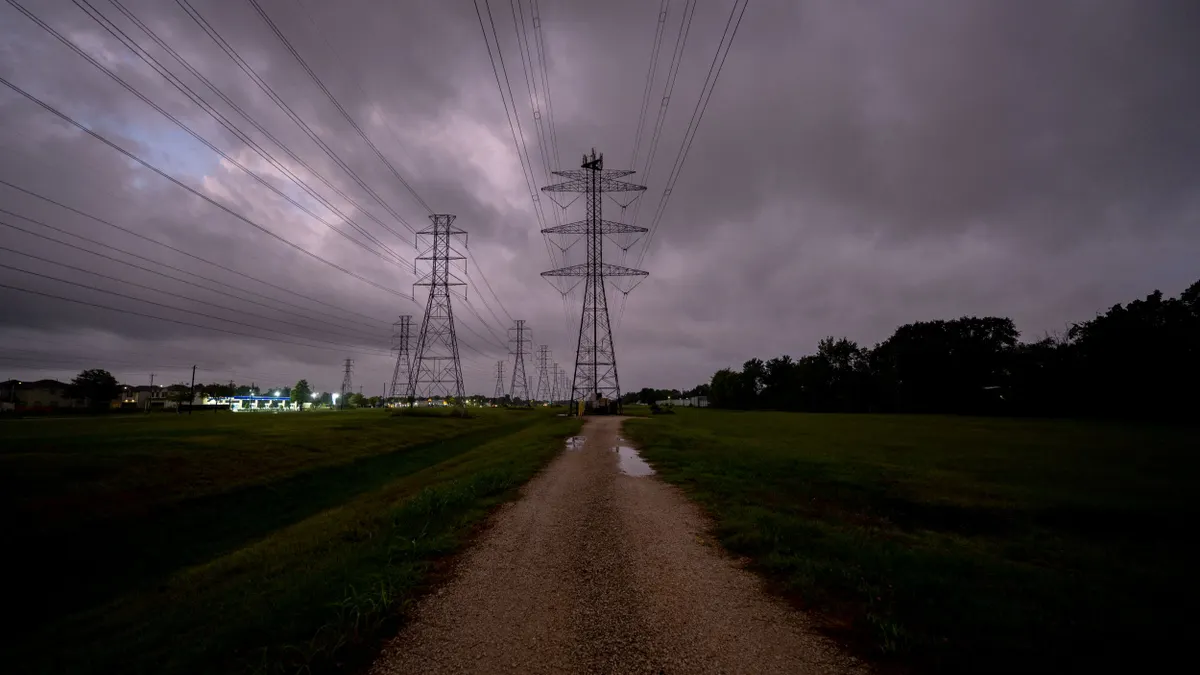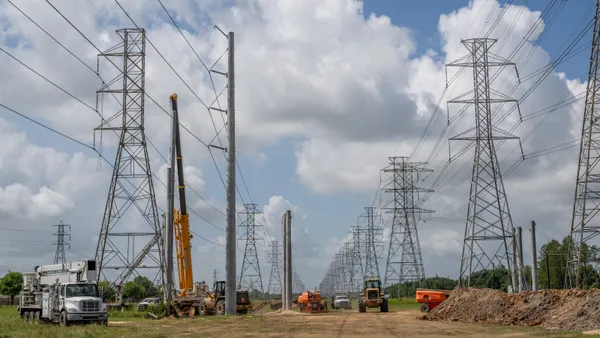North Carolina House Republicans on Tuesday unveiled the comprehensive energy bill that Duke Energy had promised its shareholders.
The legislation would reduce carbon emissions 61% below 2005 levels by 2030, a bit lower than Democratic Gov. Roy Cooper's goal of 70% by that time, and keep some coal plants online beyond 2027, while retiring others early and replacing them with natural gas or renewables. It also calls for 55% of renewable energy generation to be owned by Duke, and 45% by independent power producers, and establishes a multiyear rate plan — something the utility has long pushed for.
Democrats say a comprehensive energy update is necessary, but that amendments will need to be made to this bill for it to pass. They and other stakeholders in the state, including ratepayer advocates and environmentalists, were left out of the closed-door negotiations that produced the legislation.
"It's hard to see fixes that could make it acceptable," said Gudrun Thompson, a senior attorney with the Southern Environmental Law Center. She was part of a coalition that had worked with Duke last fall on examining broader energy reform opportunities in the state, and was subsequently shut out of negotiations on the legislation.
"A bad process is likely to result in a bad bill," she said.
HB 951
Months of negotiations between Duke, the renewable energy industry, industrial consumer advocates and Republicans culminated in a 48-page bill, House Bill 951, introduced to the state's House of Representatives this week that would represent the largest change to North Carolina's clean energy policy since 2017.
It's a response, in part, to Gov. Cooper's executive order and his administration's successive clean energy plan that would reduce the state's emissions 70% below 2005 emissions in the next decade. The bill would have the utility retire units 1 and 2 of the Marshall coal plant by 2026, eight years earlier than planned and replace it with natural gas, and accelerate the Allen coal plant retirement slightly — from 2024 to 2023 — and replace that plant with renewable energy and storage.
"We consistently hear from our customers that they want their energy to come from cleaner sources and they want Duke Energy to make those investments while keeping energy prices affordable," said Duke spokesperson Grace Rountree in an email. "With that in mind, we support our state leaders charting a path forward for an orderly energy transition – one that supports communities and helps ensure the continued affordability and reliability our customers depend on."
Duke's Roxboro plant may retire in 2027, but under the proposed language that retirement would be contingent on whether the Mountain Valley Pipeline is granted its Southgate extension — which a replacement gas plant would need to tap into.
Expanding the Mountain Valley Pipeline has been a contentious issue in the state: The North Carolina Department of Environmental Quality rejected the extension for the second time in April, after it was remanded back to them by a federal appeals court. Two other coal plants, the Cliffside and Mayo facilities, would retire in 2028 and 2029, respectively, under the legislation. The 2,240 MW Belews Creek plant, operating since 1974, and remodeled to allow natural gas co-firing in 2020, would remain without a retirement date under the bill.
Some in the solar industry were pleased with the bill, which expands the Competitive Procurement of Renewable Energy law, by requiring power providers in the state procure an additional 777 MW of renewable energy per year through a competitive bidding process through 2026. It also follows the South Carolina model of net metering, preserving 1-to-1 credits while also accounting for the variability of solar rates, and allows small power producers to extend their power purchase agreements by a decade and lower their current contracted rate.
The Carolinas Clean Energy Business Association, which was a part of the negotiations, said in a statement it "is encouraged by the proposed expansion of the CPRE program in H 951, as well as the accelerated retirement of uneconomic coal plants and an expanded opportunity for customers to participate in renewable energy programs. We look forward to continuing to work with legislators, stakeholders, and the Cooper Administration to ensure that the final bill provides North Carolinians all the benefits of competitive procurement of low cost renewable energy."
But despite accelerated coal retirements and improved solar policies, Democrats are not sold on the bill.
Legislation would 'grease the skids for gas'
Democratic legislators have already begun to meet with Republican leadership to voice their concerns about the bill, including that it will replace a large amount of coal capacity with gas. Duke argues that transitioning to cleaner energy will require some gas-fired power.
"It’s important to leverage an 'all of the above' strategy by investing in storage, renewables, cleaner burning natural gas and carbon-free nuclear. Gas facilities are included in our plan to help us ensure reliability for customers, meet carbon reduction goals faster and compliment growing renewables on our system which are not available 24/7," said Rountree.
Support from at least some Democrats will be crucial to getting the bill signed by the governor, and for passing it through the House to begin with, given some Republicans are likely to oppose the solar provisions, said Rep. Graig Meyer, D.
The four Republican sponsors of the bill and Gov. Cooper's office did not respond to requests for comment.
One sticking point for Democrats will likely be the coal-to-gas switching, Meyer said.
"We don't believe in replacing one stranded asset with another stranded asset," he said.
Rep. Pricey Harrison, D, is also concerned about the potential stranded asset costs of adding new gas plants, pointing to a January report that found Duke's long-term resource plans could lead to $4.8 billion in stranded asset costs through 2074. And environmental advocates note that this bill would essentially "grease the skids for gas," by putting plans to build out the plants into law rather than having them go through the proper regulatory channels.
It's unclear where Democrats and Republicans will find common ground, said Harrison and Meyer. Both legislators are opposed to building out new fossil fuel plants, and Meyer said he would potentially compromise on retirement dates for the coal plants in order to find more sustainable replacement capacity. One aspect of the bill that may be controversial, according to Meyer, but could provide a zero-emission path away from coal, would allow Duke to incur up to $50 million in costs to pursue a permit from federal regulators in order to site an advanced nuclear reactor in North Carolina.
Thompson argues the coal-to-gas dilemma could be solved in part by getting replacement capacity through a competitive, all-source procurement, to ensure the least-cost, replacement resource portfolio for retiring coal plant capacity.
But this bill would lower regulatory oversight over the long-term integrated resource plan process, by greenlighting gas plants through the legislature, she said. And, Thompson, Meyer and Harrison point out, the multiyear rate provision lowers regulatory oversight even further.
Multiyear rate plan
Duke has been pushing for a multiyear rate plan for years, and its last push to implement such a policy failed in the 2019 legislative session following controversy on both sides of the aisle. The current iteration is an improvement over the previous proposal, said Meyer and Harrison, but there are still concerns it will erode regulatory oversight.
The biggest improvements according to Harrison, are the inclusion of performance-based ratemaking into the multiyear rate plan. The proposal would also allow for decoupling, or separating the amount of energy a utility sells with the profit it receives, thus leading to greater incentives for Duke to invest in energy efficiency. Duke said "it is important to incentivize clean energy investments and modern cost recovery mechanisms which this bill addresses."
But the plan would also allow the utility to submit a rate plan that encompasses costs for the next three years, based on projected costs of service. The utility argues this will cut back on costly regulatory processes, but Meyer and Thompson say it could allow the utility to overearn, given it eliminates annual oversight on the ratemaking process.
"The potential for over earnings is the real problem," said Thompson. "We welcome provisions that would retire coal, but at the same time taking away utilities commission's ability to regulate" is an issue.
Finally, Thompson pointed out that the bill does not include a study to look at the potential benefits of all-source competitive procurements, an energy imbalance market or even a regional transmission organization (RTO). The stakeholder process that convened last fall before negotiations on the bill began had agreed that would be a good thing for the state to look at, she said, and a similar study is happening in South Carolina. But Duke opposes such a bill and there has been a campaign in the state against studying RTO expansion.
"It makes you wonder, what are they afraid of?" said Thompson. "Is the study going to show it's a good option? Otherwise, what do they have to fear from a study?"
Correction: An earlier version of this story misidentified the portion of the Marshall plant retiring. Units 1 and 2 would retire by 2026.





















